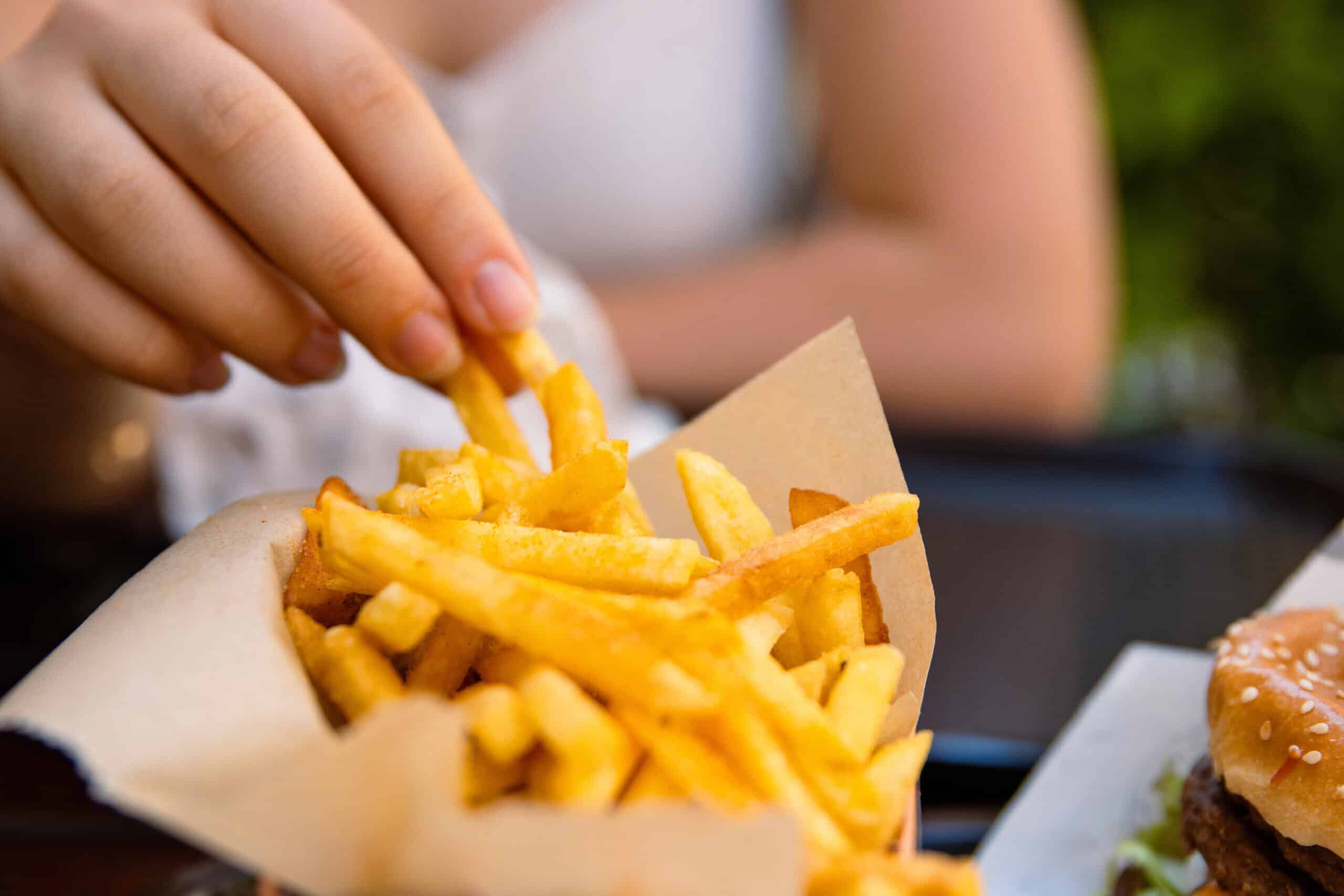What Is Food Noise?
Many people who try GLP-1 agonists (weight loss medications) attribute their weight loss success to a reduction in ‘food noise.’ But what is food noise? The term may be new to you, but it may be something you’re unknowingly dealing with.
Please note: Food noise may be a symptom of a more complex issue. If you are experiencing food noise, we encourage you to seek support from your healthcare provider.
What is food noise?
Food noise is the internal chatter in our brains that sparks hunger and the urge to eat. This thought process often includes how, what, when and where to eat. While these are all things we need to think about on a daily basis, food noise is when these thoughts begin to excessively overshadow other aspects of life, and is often found in those living with eating disorders and obesity.1
In this article, we aim to further explore the question ‘what is food noise?’ while examining why it occurs, and how to tackle it head on.
Our signature, science-based 12-week Programme is now more affordable with monthly payments.
900+ recipes, 250+ workouts and step-by-step education to help you change your life for the better.
7-DAY FREE TRIAL
Why do we experience it?
If you’re wondering ‘what is food noise?’ and ‘do I experience that?’, then it’s important to note that food noise is different to hunger. Hunger occurs when the hormone ghrelin is released as our stomach empties, prompting us to eat. So, what is food noise if not simply hungry thoughts? While poor sleep, poor diet and a lack of protein and fibre can impact healthy ghrelin production, food noise is continuous thoughts of food even when you’re not hungry.2,3,4
Examples of food noise include constantly thinking about highly palatable foods or thoughts about the next meal after you’ve just eaten. This mental preoccupation with food is one driving factor in obesity for many people as it can make it difficult to focus on anything other than eating. It can spark unhealthy eating habits leading to the consumption of ultra-processed foods, which then activates reward pathways and leads to the desire to go back for more. In this way, food noise is part of a vicious cycle.
If we’ve answered your questions about “what is food noise?” and you’re now wondering how to tackle it, then keep reading for our top tips to reduce excessive food-related thoughts.
How to reduce food noise
Battling food noise isn’t as simple as trying to avoid thinking about food. We unavoidably have to think about food on a daily basis to decide what we are going to eat and when. However, there are a few methods to try when it comes to quieting food noise:
- Improve your diet: Prioritise eating satiating foods that are rich in protein and fibre which delay gastric emptying and keeps you feeling fuller for longer.5 That way, you’ll be less likely to have hunger spur on thoughts of food throughout the day. Try also removing food triggers, where possible, by not keeping unhealthy food in your home to ease the mental load of resisting certain foods constantly.
- Plan your meals: Trying a meal plan can be a helpful way of reducing the need to wonder about what you’re going to eat next. The Fast 800 Programme curates a meal plan tailored to your dietary requirements and goals, and even comes with automated shopping lists, ultimately taking away the need to have food on your mind so much as we do the thinking for you.
- Exercise: Often, food thoughts and cravings are related to seeking dopamine, the reward hormone.6 Exercise has been shown to increase dopamine levels and decrease ghrelin levels, thereby increasing feelings of pleasure while decreasing appetite.7,8 So, next time you find yourself unable to quieten the food noise, try letting off some steam with a workout.
- Practise mindful eating: Studies show that mindfulness is effective as a treatment for food-related disorders by increasing fullness cues and reducing cravings.9,10 Try mindful eating practices by focusing on the texture, taste and smell of your food each time you eat and see if your mind quietens later on.
Can weight loss medications help with food noise?
GLP-1 agonists, like Ozempic or Wegovy, are growing in popularity as treatments for obesity. Initially designed to treat type 2 diabetes, weight loss medications have an effect on the brain that reduces appetite, slows digestion and reduces gut motility. This makes them effective for both weight loss, and for reducing food noise.
Many sufferers of food noise have found that weight loss medications can help to dramatically quieten food noise. Freed from the intrusive thoughts about food, some may then find it easier to focus on healthy eating as well as other priorities in their lives. However, it must be noted that for weight loss medications to work effectively, you must also eat a balanced diet and exercise regularly, so they are not a fix-all option.
Please note: Always consult your doctor if you are considering weight loss medications to see if they are the right option for you.
We hope we’ve answered your questions about ‘what is food noise?’, but if you have more then you can always reach our team of Health Coaches via our Programme. There’s no need to suffer from food noise in silence. There are plenty of methods, you can try to get some peace and quiet in your mind, so why not get started today?
Lydecker JA, Simpson L, Smith SR, White MA, Grilo CM. Preoccupation in bulimia nervosa, binge-eating disorder, anorexia nervosa, and higher weight. Int J Eat Disord. 2022 Jan;55(1):76-84. doi: 10.1002/eat.23630. Epub 2021 Oct 28. PMID: 34713460; PMCID: PMC8963447.
Schmid SM, Hallschmid M, Jauch-Chara K, Born J, Schultes B. A single night of sleep deprivation increases ghrelin levels and feelings of hunger in normal-weight healthy men. J Sleep Res. 2008 Sep;17(3):331-4. doi: 10.1111/j.1365-2869.2008.00662.x. Epub 2008 Jun 28. PMID: 18564298.
Blom WA, Lluch A, Stafleu A, Vinoy S, Holst JJ, Schaafsma G, Hendriks HF. Effect of a high-protein breakfast on the postprandial ghrelin response. Am J Clin Nutr. 2006 Feb;83(2):211-20. doi: 10.1093/ajcn/83.2.211. PMID: 16469977.
St-Pierre DH, Rabasa-Lhoret R, Lavoie ME, Karelis AD, Strychar I, Doucet E, Coderre L. Fiber intake predicts ghrelin levels in overweight and obese postmenopausal women. Eur J Endocrinol. 2009 Jul;161(1):65-72. doi: 10.1530/EJE-09-0018. Epub 2009 Apr 15. PMID: 19369431.
Blom WA, Lluch A, Stafleu A, Vinoy S, Holst JJ, Schaafsma G, Hendriks HF. Effect of a high-protein breakfast on the postprandial ghrelin response. Am J Clin Nutr. 2006 Feb;83(2):211-20. doi: 10.1093/ajcn/83.2.211. PMID: 16469977.
Carter A, Hendrikse J, Lee N, Yücel M, Verdejo-Garcia A, Andrews ZB, Hall W. The Neurobiology of “Food Addiction” and Its Implications for Obesity Treatment and Policy. Annu Rev Nutr. 2016 Jul 17;36:105-28. doi: 10.1146/annurev-nutr-071715-050909. Epub 2016 Jun 1. PMID: 27296500.
Marques A, Marconcin P, Werneck AO, Ferrari G, Gouveia ÉR, Kliegel M, Peralta M, Ihle A. Bidirectional Association between Physical Activity and Dopamine Across Adulthood-A Systematic Review. Brain Sci. 2021 Jun 23;11(7):829. doi: 10.3390/brainsci11070829. PMID: 34201523; PMCID: PMC8301978.
Giannopoulou I, Kotopoulea-Nikolaidi M, Daskou S, Martyn K, Patel A. Mindfulness in Eating Is Inversely Related to Binge Eating and Mood Disturbances in University Students in Health-Related Disciplines. Nutrients. 2020 Feb 2;12(2):396. doi: 10.3390/nu12020396. PMID: 32024270; PMCID: PMC7071141.
Palascha A, van Kleef E, de Vet E, van Trijp HCM. The effect of a brief mindfulness intervention on perception of bodily signals of satiation and hunger. Appetite. 2021 Sep 1;164:105280. doi: 10.1016/j.appet.2021.105280. Epub 2021 Apr 30. PMID: 33940054.
Hayashi D, Edwards C, Emond JA, Gilbert-Diamond D, Butt M, Rigby A, Masterson TD. What Is Food Noise? A Conceptual Model of Food Cue Reactivity. Nutrients. 2023 Nov 17;15(22):4809. doi: 10.3390/nu15224809. PMID: 38004203; PMCID: PMC10674813.











